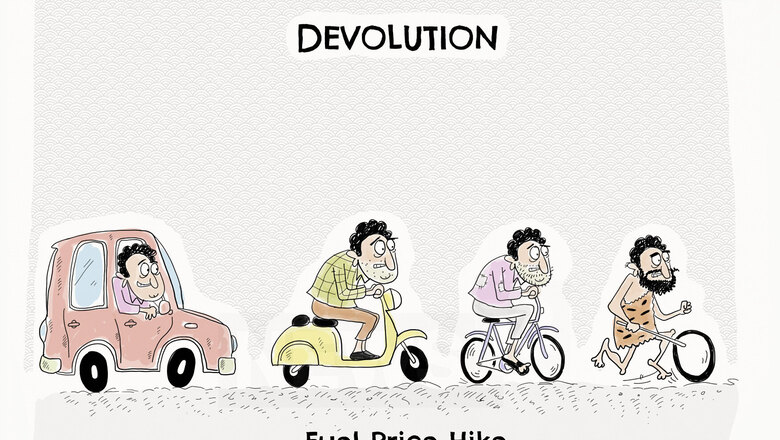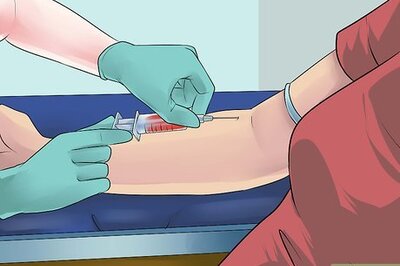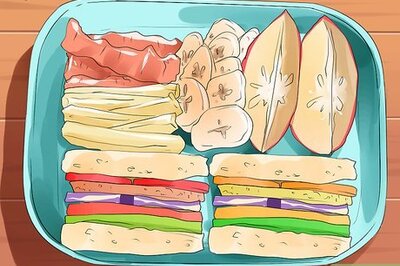
views
New Delhi: As Opposition unites to call for Bharat Bandh over rising fuel prices, services across the country are likely to be hit on the first working day of the week. The latest to join the voice of dissent is Raj Thackeray's Maharashtra Navnirman Sena (MNS).
Petrol price in the national capital on Saturday crossed the Rs 80 mark for the first time ever as rupee depreciation made imports costlier. Petrol price was Saturday raised by 39 paise a litre and diesel by 44 paise per litre, according to price notification issued by state fuel retailers. In Mumbai, a litre of petrol costs Rs 87.77 and diesel comes for Rs 76.98.
Despite the shooting prices, the fuel cost in Delhi is considered to be the cheapest among all metros and most state capitals due to lower taxes. Mumbai has the highest tax rates among the metros as apart from 25 per cent and 21 per cent Value Added Tax (VAT) on petrol and diesel respectively, the Maharashtra government has also introduced Rs 9 and Rs 1 as various cess on petrol and diesel respectively.
Lashing out at the ruling Bharatiya Janata Party (BJP) over the issue, Congress leaders Ashok Gehlot, Ahmed Patel, Motilal Vora, Mallikarjun Kharge and Randeep Singh Surjewala called for a Bharat Bandh and said the common man was bearing the brunt of escalating prices of petrol, diesel and cooking gas as well as of other essential commodities. Surjewala said the timing of the bandh is such that "the common person is not inconvenienced".
Responding to the grand old party's call, several Opposition parties, including Dravida Munnetra Kazhagam (DMK), Rashtriya Janata Dal (RJD), Pawan Kalyan's Jana Sena Party, the Left front (CPI, CPM, CPI-ML, SUCI and Forward block) and Nationalist Congress Party, extended their support to the shutdown.
BJP’s bickering ally in Maharashtra, the Shiv Sena, too, took potshots at the central government by putting up posters to mock the saffron party’s 2014 campaign slogan of ‘achhe din’. The latest to give a call was Navnirman Sena.
"We will actively participate in Monday's (September 10) Bandh. We have appealed to shopkeepers to keep their shutters down and establishments closed. We won't resort to violence, but we will ask people to support the bandh," MNS leader Sandeep Deshpande.
Appealing to Maharashtra residents to put aside political and ideological differences and support the shutdown, Raj Thackeray advised people not to damage property or let common man suffer in wake of the protest. All 27 market committees of the state too have extended their support.
Mumbai Congress president Sanjay Nirupam said that while he wants people to move out of their homes and join the protest, schools, colleges, hospitals and emergency services have been exempted from the bandh.
On the other hand, several educational institutions in Karnataka, Odisha and Bihar will remain closed. Odisha government has directed all schools to remain closed, Private Schools Association and Children's Welfare Association (PSACWA) have announced to shut private schools in Bihar for "safety of staff and children", while schools in Bengaluru have decided to have full-day classes on Saturday (September 15) to compensate for the closure on Monday.
Some parties like Samajwadi Party and Mayawati's Bahujan Samaj Party (BSP) in Uttar Pradesh and Tamil Nadu's ruling All India Anna Dravida Munnetra Kazhagam (AIADMK) are yet to issue an official statement on the call for bandh. On the other hand, Mamata Banerjee's Trinamool Congress (TMC) said that it would take out protest marches across the state on Monday, but would not let public utility services be affected because of the shutdown.
Since mid-August, petrol price has risen by Rs 3.24 a litre and diesel by Rs 3.74 per litre as rupee hit record low against the US dollar, making imports costlier. This is the biggest increase in rates in any fortnight since the daily price revision was introduced in mid-June last year. Almost half of the retail selling price of the two fuels is made up of central and state taxes.
The Centre currently levies a total excise duty of Rs 19.48 per litre of petrol and Rs 15.33 per litre on diesel. On top of this, states levy Value Added Tax (VAT) -- the lowest being in Andaman and Nicobar Islands where 6 per cent sales tax is charged on both the fuels.
Mumbai has the highest VAT of 39.12 per cent on petrol, while Telangana levies the highest VAT of 26 per cent on diesel. Delhi charges a VAT of 27 per cent on petrol and 17.24 per cent on diesel.
The Central government had raised excise duty on petrol by Rs 11.77 a litre and that on diesel by 13.47 a litre in nine installments between November 2014 and January 2016 to shore up finances as global oil prices fell, but then cut the tax just once in October last year by Rs 2 a litre.
This led to its excise collections from petro goods more than doubling in the last four years — from Rs 99,184 crore in 2014-15 to Rs 2,29,019 crore in 2017-18. States saw their VAT revenue from petro goods rise from Rs 1,37,157 crore in 2014-15 to Rs 1,84,091 crore in 2017-18.




















Comments
0 comment